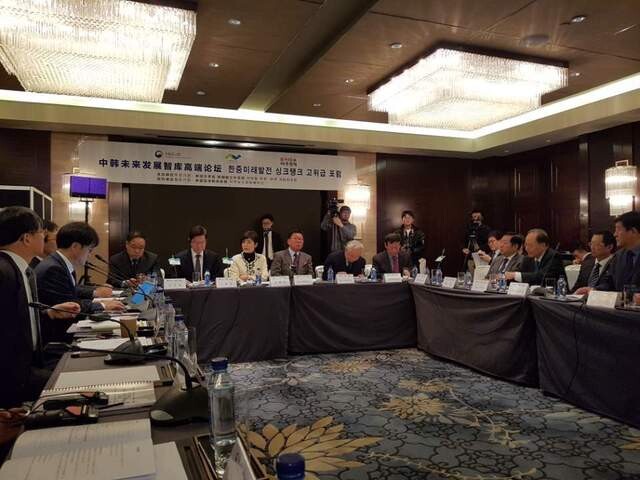hankyoreh
Links to other country sites 다른 나라 사이트 링크
THAAD remains potential stumbling block during President Moon’s visit to China

Experts from both South Korea and China believe that South Korean President Moon Jae-in’s visit to China from Dec. 13 to 16 may represent a turning point for the two countries’ relations, which have been frozen since the THAAD missile defense system was deployed in South Korea. But the two countries are not yet on the same page, with South Korea putting the emphasis on improving ties while many Chinese still hold that the THAAD issue has not yet been completely resolved.
On Dec. 11, academics and journalists from the two countries sat down together at a high-level forum in Beijing organized by the South Korea-China Future Development think tank on the theme of “desirable relations between South Korea and China during a time of change” to debate bilateral relations and the situation on the Korean Peninsula in the run-up to Moon’s visit to China. Jointly organized by the Korea National Diplomatic Academy, China’s Charhar Institute, the Chinese People's Institute of Foreign Affairs, and the China Public Diplomacy Association, the forum was attended by more than 50 people, including South Korean Public Diplomacy Ambassador Park Eun-ha and Han Fangming, Chairman of the Charhar Institute and Vice Chairman of the Foreign Affairs Committee of the Chinese People's Political Consultative Conference.
“South Korea-China relations may be facing a temporary challenge, but President Moon’s visit to China could be the turning point. It’s important to respect each other’s perspectives and areas of interest and to use conflict management to create a blueprint for the future of our bilateral relations,” Park emphasized.
Chinese People's Institute of Foreign Affairs (CPIFA) vice president Wei Wei said Moon’s visit “holds great significance at a time when the North Korean nuclear crisis is intensifying.”
“I hope this visit can be a turning point in resolving the North Korean nuclear crisis,” he added.
At the same time, Wei noted that the THAAD issue “remains a stumbling block to South Korea-China relations.”
“Without a complete resolution of the THAAD issue, a complete improvement in relations is out of the question,” he warned.
“The political situation on the Korean Peninsula has reached a highly sensitive critical point. The greater responsibility for the worsening crisis on the Korean Peninsula lies with South Korea and the US,” Wei continued, expressing a different position from the South Korean side.
“There has been a vicious cycle where South Korea-US joint exercises have provoked North Korea,” he declared.
In response, Institute for National Security Strategy adviser Bae Ki-chan said South and North Korea “remain in an armistice situation where the war is not over, and one side has declared the completion of its nuclear armament. What would China do [in that position]?”
“It’s going to be tough to resolve this issue without considering the other side’s position,” he continued.
“We need to get North Korea to declare a halt to nuclear missile testing and create an opportunity for North Korea-US dialogue before the Pyeongchang Olympics next February,” Bae suggested.
Kwangwoon University professor Shin Sang-jin said it was “natural” for there to be conflicts between South Korea and China, adding that “escalation in the North Korean nuclear issue has had an influence on the THAAD deployment.”
“South Korea and China each need to respect the other side’s position,” he said.
“China also needs to be aware that positive attitudes toward it in South Korea could be hurt if it emphasizes its own interests too strongly,” he warned.
Tsinghua University professor Zhao Kejin said, “China knows exactly why South Korea has deployed THAAD and South Korea knows exactly why China opposes it.”
“South Korea has underestimated China’s commitment to opposing the THAAD deployment, and China has underestimated South Korea’s commitment to the THAAD deployment,” he added.
“Relations between South Korea and China will inevitably suffer if tensions increase over North Korea. They need to work together in opposing war and finding a path toward cooperation.”
By Park Min-hee, international editor
Please direct questions or comments to [english@hani.co.kr]

Editorial・opinion
![[Editorial] Does Yoon think the Korean public is wrong? [Editorial] Does Yoon think the Korean public is wrong?](https://flexible.img.hani.co.kr/flexible/normal/500/300/imgdb/original/2024/0417/8517133419684774.jpg) [Editorial] Does Yoon think the Korean public is wrong?
[Editorial] Does Yoon think the Korean public is wrong?![[Editorial] As it bolsters its alliance with US, Japan must be accountable for past [Editorial] As it bolsters its alliance with US, Japan must be accountable for past](https://flexible.img.hani.co.kr/flexible/normal/500/300/imgdb/original/2024/0417/6817133413968321.jpg) [Editorial] As it bolsters its alliance with US, Japan must be accountable for past
[Editorial] As it bolsters its alliance with US, Japan must be accountable for past- [Guest essay] Amending the Constitution is Yoon’s key to leaving office in public’s good graces
- [Editorial] 10 years on, lessons of Sewol tragedy must never be forgotten
- [Column] A death blow to Korea’s prosecutor politics
- [Correspondent’s column] The US and the end of Japanese pacifism
- [Guest essay] How Korea turned its trainee doctors into monsters
- [Guest essay] As someone who helped forge Seoul-Moscow ties, their status today troubles me
- [Editorial] Koreans sent a loud and clear message to Yoon
- [Column] In Korea’s midterm elections, it’s time for accountability
Most viewed articles
- 1[Column] The clock is ticking for Korea’s first lady
- 2Samsung barricades office as unionized workers strike for better conditions
- 3[Editorial] When the choice is kids or career, Korea will never overcome birth rate woes
- 4[News analysis] After elections, prosecutorial reform will likely make legislative agenda
- 5S. Korea, Japan reaffirm commitment to strengthening trilateral ties with US
- 6Japan officially says compensation of Korean forced laborers isn’t its responsibility
- 7Why Israel isn’t hitting Iran with immediate retaliation
- 8[Editorial] Does Yoon think the Korean public is wrong?
- 9[Guest essay] How Korea turned its trainee doctors into monsters
- 10[Editorial] As it bolsters its alliance with US, Japan must be accountable for past